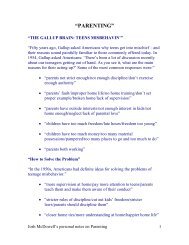Pdf Copy of Orthodoxy, by G.K. Chesterton - Christ United Methodist ...
Pdf Copy of Orthodoxy, by G.K. Chesterton - Christ United Methodist ...
Pdf Copy of Orthodoxy, by G.K. Chesterton - Christ United Methodist ...
Create successful ePaper yourself
Turn your PDF publications into a flip-book with our unique Google optimized e-Paper software.
9/ 27/ 12 The Pr oject G ut enber g eBook <strong>of</strong> O r t hodoxy, G . K. Chest er t on<br />
www. gut enber g. or g/ f iles/ 16769/ 16769- h/ 16769- h. ht m<br />
An imbecile habit has arisen in modern controversy <strong>of</strong> saying that such and such a creed can<br />
be held in one age but cannot be held in another. Some dogma, we are told, was credible in<br />
the twelfth century, but is not credible in the twentieth. You might as well say that a certain<br />
philosophy can be believed on Mondays, but cannot be believed on Tuesdays. You might as<br />
well say <strong>of</strong> a view <strong>of</strong> the cosmos that it was suitable to half-past three, but not suitable to<br />
half-past four. What a man can believe depends upon his philosophy, not upon the clock or<br />
the century. If a man believes in unalterable natural law, he cannot believe in any miracle in<br />
any age. If a man believes in a will behind law, he can believe in any miracle in any age.<br />
Suppose, for the sake <strong>of</strong> argument, we are concerned with a case <strong>of</strong> thaumaturgic healing. A<br />
materialist <strong>of</strong> the twelfth century could not believe it any more than a materialist <strong>of</strong> the<br />
twentieth century. But a <strong>Christ</strong>ian Scientist <strong>of</strong> the twentieth century can believe it as much as<br />
a <strong>Christ</strong>ian <strong>of</strong> the twelfth century. It is simply a matter <strong>of</strong> a man's theory <strong>of</strong> things. Therefore<br />
in dealing with any historical answer, the point is not whether it was given in our time, but<br />
whether it was given in answer to our question. And the more I thought about when and<br />
how <strong>Christ</strong>ianity had come into the world, the more I felt that it had actually come to answer<br />
this question.<br />
It is commonly the loose and latitudinarian <strong>Christ</strong>ians who pay quite indefensible<br />
compliments to <strong>Christ</strong>ianity. They talk as if there had never been any piety or pity until<br />
<strong>Christ</strong>ianity came, a point on which any mediæval would have been eager to correct them.<br />
They represent that the remarkable thing about <strong>Christ</strong>ianity was that it was the first to preach<br />
simplicity or self-restraint, or inwardness and sincerity. They will think me very narrow<br />
(whatever that means) if I say that the remarkable thing about <strong>Christ</strong>ianity was that it was the<br />
first to preach <strong>Christ</strong>ianity. Its peculiarity was that it was peculiar, and simplicity and sincerity<br />
are not peculiar, but obvious ideals for all mankind. <strong>Christ</strong>ianity was the answer to a riddle,<br />
not the last truism uttered after a long talk. Only the other day I saw in an excellent weekly<br />
paper <strong>of</strong> Puritan tone this remark, that <strong>Christ</strong>ianity when stripped <strong>of</strong> its armour <strong>of</strong> dogma (as<br />
who should speak <strong>of</strong> a man stripped <strong>of</strong> his armour <strong>of</strong> bones), turned out to be nothing but<br />
the Quaker doctrine <strong>of</strong> the Inner Light. Now, if I were to say that <strong>Christ</strong>ianity came into the<br />
world specially to destroy the doctrine <strong>of</strong> the Inner Light, that would be an exaggeration. But<br />
it would be very much nearer to the truth. The last Stoics, like Marcus Aurelius, were<br />
exactly the people who did believe in the Inner Light. Their dignity, their weariness, their sad<br />
external care for others, their incurable internal care for themselves, were all due to the Inner<br />
Light, and existed only <strong>by</strong> that dismal illumination. Notice that Marcus Aurelius insists, as<br />
such introspective moralists always do, upon small things done or undone; it is because he<br />
has not hate or love enough to make a moral revolution. He gets up early in the morning, just<br />
as our own aristocrats living the Simple Life get up early in the morning; because such<br />
altruism is much easier than stopping the games <strong>of</strong> the amphitheatre or giving the English<br />
people back their land. Marcus Aurelius is the most intolerable <strong>of</strong> human types. He is an<br />
unselfish egoist. An unselfish egoist is a man who has pride without the excuse <strong>of</strong> passion. Of<br />
all conceivable forms <strong>of</strong> enlightenment the worst is what these people call the Inner Light. Of<br />
all horrible religions the most horrible is the worship <strong>of</strong> the god within. Any one who knows<br />
any body knows how it would work; any one who knows any one from the Higher Thought<br />
Centre knows how it does work. That Jones shall worship the god within him turns out<br />
ultimately to mean that Jones shall worship Jones. Let Jones worship the sun or moon,<br />
anything rather than the Inner Light; let Jones worship cats or crocodiles, if he can find any in<br />
42/ 100





